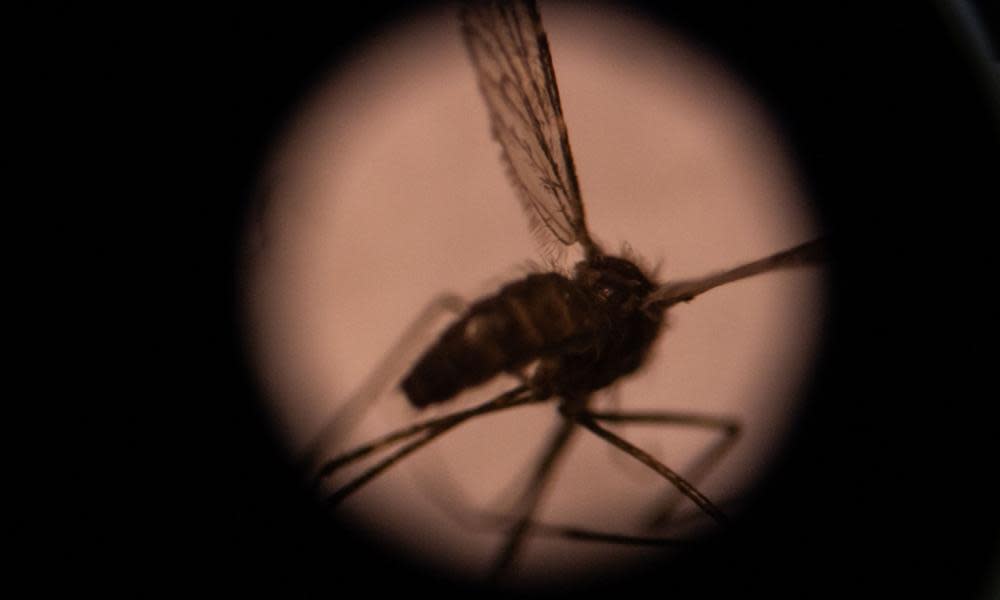Covid could derail efforts to eradicate malaria in Pacific, health experts warn

The global Covid-19 pandemic could derail efforts to control and eradicate malaria across the Pacific, with the potential for thousands of new cases and deaths, health experts have warned.
Malaria, one of the oldest diseases on Earth, remains one of its most significant killers: the mosquito-borne disease still kills 400,000 people a year, most of those children under five.
Related: Demand for coronavirus tests raises concerns over HIV and malaria
Professor Brendan Crabb, chair of Pacific Friends of Global Health and chief executive of the Burnet Institute, said the Pacific was at acute risk if intervention measures were disrupted within health systems overwhelmed by, or focused on, Covid-19.
“There are a number of infectious diseases that could spike if we ignore them in the wake of the focus on Covid-19, but none are more acute than the short-term risk that malaria poses. It can double, even triple or worse in a single season if the wheels come off control measures.”
In Papua New Guinea, where malaria remains highly endemic, cases numbers surged between 2001 and 2016 – from 80,000 to 500,000 every year – when control measures weakened.
A recent Lancet study said disruptions to malaria interventions could lead to 46m additional cases worldwide.
Crabb said malaria, HIV, TB and maternal and child healthcare were all at serious risk as already-fragile healthcare systems in developing countries struggled to respond to Covid-19.
“But it is malaria that can explode the fastest – it is a very real threat in and of itself and it is also the ‘canary in the coalmine’ that indicates when we again have health problems in our region.”
With a number of potential Covid-19 vaccines across the world in phase three trials, a majority of Australians want the government to provide Covid-19 vaccines to countries across the Pacific and south-east Asia, a new poll shows.
Polling from Essential Media shows 55% of Australians either somewhat agree or strongly agree that funding the distribution of a Covid-19 vaccine to the Asia Pacific was in Australia’s interest.
And a similar proportion – 56% – believe that if Australia doesn’t support countries in the Asia Pacific region with major issues such as Covid-19, it risks rival nations like China becoming too influential.
Australia has been preeminent in providing medical and financial support to Pacific countries impacted by the novel coronavirus pandemic, or whose economies have suffered because of Covid-19 border closures. China, by contrast, has made significantly smaller aid contributions.
Fifty-seven per cent of people agree the Australian economy cannot fully recover until trading partners in the region have got Covid-19 under control.
Beyond the health impacts of Covid-19 and efforts to distribute vaccines around the world, chief executive of Results International (Australia), Negaya Chorley, said Australia was surrounded by nations that will struggle with the secondary impacts of the pandemic.
“The Gates Foundation has estimated that the developing world lost 25 years of progress in just 25 weeks in 2020. The pandemic will leave a profound mark on developing countries which will be felt for years to come.
“As a result of Covid-19, TB, HIV and malaria rates are all set to rise, along with child and maternal mortality.”
Chorley said beyond the moral case for Australia supporting its neighbours, there were economic and political arguments for broad and sustained regional intervention.
“Australians see the benefit in supporting our neighbours … indeed we are ready to put our neighbours not just in the queue but at the head of the queue.”
Related: Australia's Covid vaccines: everything you need to know
The Australian health minister, Greg Hunt, said last month the agreements Australia had signed with vaccine manufacturers would allow it to donate vaccines to countries in the Pacific and south-east Asia “should these vaccines prove safe and effective, and units are available above domestic needs”.
Australia has established a $300m Covid-19 response package to assist with economic and social recovery in the Pacific region and contributed $80m to the international Covax facility to assist high-risk populations in developing countries get vaccines.
Amnesty International Australia has written to Hunt over Australia’s vaccine plan.
The Australian government has ordered 33.8m doses from Oxford/AstraZeneca, 51m doses of the University of Queensland/CSL vaccine, 40m doses of the Novavax vaccine, and 10m doses of the Pfizer/BioNTech vaccine.
Related: Hydroxychloroquine: US revokes emergency approval of malaria drug for Covid-19
“Does Australia need 134.8m doses for a population of 25m people?” national director Sam Klintworth wrote. “This equates to more than five doses per person. It is projected that most of the vaccines will require two doses.”
Klintworth argued the region needs certainty, and that Australia should “explicitly state how many vaccine doses are likely required and that will be made available to partners in the Pacific and south-east Asia”.
Last month, a panel of UN public health experts urged governments not to hoard vaccine supplies and called on pharmaceutical companies to share technologies and expertise so all countries can access treatments equally.


